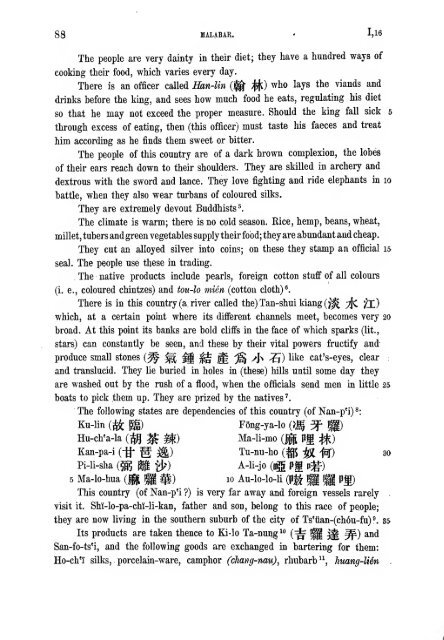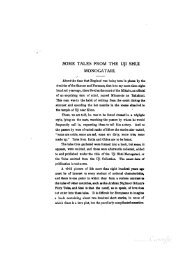Chau Ju-Kua - University of Oregon Libraries
Chau Ju-Kua - University of Oregon Libraries
Chau Ju-Kua - University of Oregon Libraries
Create successful ePaper yourself
Turn your PDF publications into a flip-book with our unique Google optimized e-Paper software.
88 MALABAR. ' 1,16<br />
The people are very dainty in their diet; they have a hundred ways <strong>of</strong><br />
cooking their food, vfhich varies every day.<br />
There is an <strong>of</strong>ficer called Han-lin (^ J^) who lays the viands and<br />
drinks before the king, and sees how much food he eats, regulating his diet<br />
so that he may not exceed the proper measure. Should the king fall sick 5<br />
through excess <strong>of</strong> eating, then (this <strong>of</strong>ficer) must taste his faeces and treat<br />
him according as he finds them sweet or bitter.<br />
The people <strong>of</strong> this country are <strong>of</strong> a dark brown complexion, the lobes<br />
<strong>of</strong> their ears reach down to their shoulders. They are skilled in archery and<br />
dextrous with the sword and lance. They love fighting and ride elephants in lo<br />
battle, when they also wear turbans <strong>of</strong> coloured silks.<br />
They are extremely devout Buddhists^.<br />
The climate is warm; there is no cold season. Rice, hemp, beans, wheat,<br />
millet, tubers and green vegetables supply their food; they are abundant and cheap.<br />
They cut an alloyed silver into coins; on these they stamp an <strong>of</strong>ficial 15<br />
seal. The people use these in trading.<br />
, The<br />
native products include pearls, foreign cotton stuff <strong>of</strong> all colours<br />
(i. e., coloured chintzes) and tou-lo mien (cotton cloth)*.<br />
There is in this country (a. river called the) Tan-shui kiang Q^ jjf. ;^x)<br />
which, at a certain point where its different channels meet, becomes very 20<br />
broad. At this point its banks are bold cliffs in the face <strong>of</strong> which sparks (lit.,<br />
stars) can constantly be seen, and these by their vital powers fructify and<br />
produce small stones (^ Wij ^^ ^ ^ A^ ^\) ^^^^ cat's-eyes, clear<br />
and translucid. They lie buried in holes in (these) hills until some day they<br />
are washed out by the rush <strong>of</strong> a flood, when the <strong>of</strong>ficials send men in little 25<br />
boats to pick them up. They are prized by the natives''.<br />
The following states are dependencies <strong>of</strong> this country (<strong>of</strong> Nan-p'i)^:<br />
Ku-lin (^ gg)<br />
Fong-ya-lo OM 3f W<br />
Hu-ch'a-la {^^ ^ ^)<br />
Ma-li-mo (jg {!i #)<br />
Kan-pa-i (-^ g ^) Tu-nu-ho (|5 ^ ^) 30<br />
Pi-li-sha (5B5 m '&) A-li-jo (1^ Pi p^)<br />
5 Ma-lo-hua (^ % ^)<br />
10 Au-lo-lo-li (Pf || ^ {3f<br />
This country (<strong>of</strong> Nan-p'i ?) is very far away and foreign vessels rarely .<br />
visit it. Shi-lo-pa-chi-li-kan, father and son, belong to this race <strong>of</strong> people;<br />
they are now living in the southern suburb <strong>of</strong> the city <strong>of</strong> Ts'uan-(ch6u-fu)^ 35<br />
Its products are taken thence to Ki-lo Ta-nupg " (^ ^ ^ ^) and<br />
San-fo-ts'i, and the following goods are exchanged in bartering for them:<br />
Ho-ch'i silks, porcelain-ware, camphor (chang-nau), rhubarb", huang-lien<br />
)

















